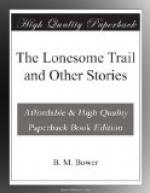When the shadow of the schoolhouse stretched somberly away to the very edge of the coulee. Miss Satterly gathered up the studied confusion on her desk, bundled the papers inside, and turned the key with a snap, jabbed three hatpins viciously through her hat and her hair and went home—and perhaps it were well that Weary was not there at that time.
The next night, papers strewed the desk as before, and the schoolma’am stood by the window, her elbows planted on the unpainted sill, and watched the trail listlessly. Her eyes were big and wistful, like a hurt child’s, and her cheeks were not red as usual, nor even pink. But the trail lay again brown, and silent, and lonesome, with no quick hoof-beats to send the dust swirling up in a cloud.
The shadows flowed into the coulee until it was full to the brim and threatening the golden hilltop with a brown veil of shade before Miss Satterly locked her door and went home. When she reached her aunt Meeker’s she did not want any supper and she said her head ached. But that was not quite true; it was not her head that ached so much; it was her heart.
The third day, the schoolma’am fussed a long time with her hair, which she did in four different styles. The last style was the one which Weary had pronounced “out uh sight”—only she added a white chiffon bow which she had before kept sacred to dances and which Weary always admired. At noon she encouraged the children to gather wild flowers from the coulee, and she filled several tin cans with water from the spring and arranged the bouquets with much care. Weary loved flowers. Nearly every time he came he had a little bunch stuck under his hat-band. A few she put in her hair, along with the chiffon bow. She urged the children through their work and dismissed them at eleven minutes to four and told them to go straight home.
After she had swept the floor and dusted everything that could be dusted so that the school-room had the peculiar, immaculate emptiness and forlornness, like a church on a week day, and had taken a few of the brightest flowers and pinned them upon her white shirt-waist. Miss Satterly tuned her guitar in minor and went out and sat upon the shady doorstep and waited frankly, strumming plaintive little airs while she watched the trail. To-morrow was Labor Day, and so he would certainly ride over to-night to see if she had really meant it (Miss Satterly did not explain to herself what “it” was; surely, there was no need).
At half-past five—Miss Satterly had looked at her watch seventeen times during the interval—a tiny cloud of dust rose over the brow of the hill, and her heart danced in her chest until she could scarce breathe.




